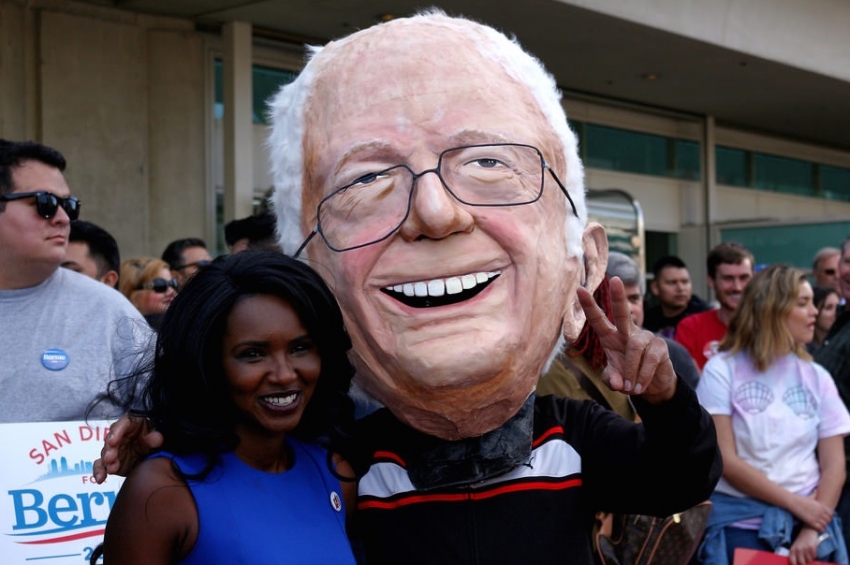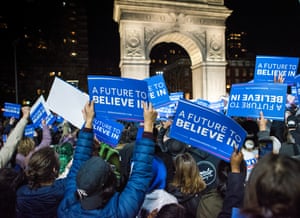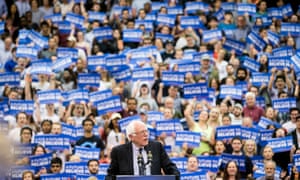CNN politics

Nearly five years since Occupy was evicted from Zuccotti Park, blocks from the New York Stock Exchange in lower Manhattan, a coalition of organizers, labor leaders and progressive activists who lined up under the banner of "the 99 percent" are renewing their efforts in pursuit of a more traditional cause: Getting voters to the polls on April 19.
That begins with traditional canvassing, but will extend to what is expected to be a large pro-Sanders, Occupy-inspired march on Saturday in Manhattan.
"This is the place where the message of income inequality resonated across the country and across the world -- it's where it really began," said "People for Bernie" co-founder and Occupy activist Winnie Wong. "He's bringing it back home."
In Sanders and in his campaign, the more mainstream elements of Occupy Wall Street have found an ideological ally. The Vermont senator's laser focus on economic issues are a big draw, local organizers said, but they also delight in his affection for the shoe-leather activism of past generations.
"Canvassing and using apps to get people to vote and all that microtargeting stuff, that's important, but so is marching in the streets," said Charles Lenchner, who joined with Wong after efforts to draft Sen. Elizabeth Warren into the presidential race fell flat. Their "People for Bernie" popularized the "Feel the Bern" hashtag, a potent organizing tool and, nearly a year after its launch, a world-famous meme.
For Lenchner and many of his peers, the Sanders candidacy represents a logical extension -- and validation -- of the original movement.
"Occupy was a reaction to the financial collapse, to what happened because of Wall Street's power to destroy the economy, and Bernie's campaign is the one that has been consistently focused on the role of the '1 Percent,' large corporations and financial institutions," he said. "It's a very natural connection."
The Occupy-Sanders mind meld
A public show of electoral solidarity -- and a sign of things to come -- came last month, when prominent Occupy organizer Beka Economopoulos led a phone-banking effort for Sanders from Zuccotti Park. "It was another one of those moments that helped solidify the connection between the folks who had been part of Occupy and the Sanders campaign," Lenchner said.
Occupy Wall Street as a coherent political project had already begun to fray by the time the New York Police Department, acting on orders from the city's then-mayor, Michael Bloomberg, cleared the park, arresting more than 240 protesters nearly two months after the "occupation" had begun.
Many of the more pragmatic activists had become baffled or frustrated by the avant-garde in their midst, and had largely soured on the spectacle. Questions about the immediate direction of the movement could not be settled.
Despite the inner tumult and outside mockery, aspects of the animating message behind the Occupy protests -- which eventually spanned more than 1,000 locations across the country -- have become part of the current political discussion.
"Occupy Wall Street helped create the political climate that helped Bernie's message to resonate so widely, simply by shining a spotlight on issues of Wall Street greed and income inequality," Sanders spokesman Karthik Ganapathy told CNN.
The Sanders campaign is now seeing various elements of the old Occupy coalition working together to build momentum ahead of what could be a make-or-break contest in the primary battle against Hillary Clinton.
"We've been able to tap into the energy of (Occupy) and channel that into something tangible and concrete and forward-looking," Ganapathy said. "They're here [working on the campaign]. I see them, I see a lot of them volunteering, making phone calls, knocking on doors. It's a natural fit."
Occupy's laundry list of economic grievances largely mirrored Sanders' own, and in 2011 he emerged as one of the movement's earliest defenders.
"I applaud them," he told CNN's Wolf Blitzer at the time. "They are speaking to the real anger and frustration that millions of Americans feel at a time when the middle class is collapsing, poverty is increasing, the people on top are doing phenomenally well."
What the movement can do for Sanders
Now, they are returning the favor -- and their effort is transcending routine "get-out-the-vote" activities.
The independent journalists and activists who helped write the free "Occupied Wall Street Journal" in fall 2011 are now poised to produce 500,000 bilingual broadsheet newspapers, as part of their crowdsourced "Battle of New York" project. The special edition, which they hope to begin printing on Wednesday, will feature essays, art and -- in a clear pivot to the mainstream -- a direct call to vote for Sanders next week.
The blitz will continue on Saturday, when a coalition led by the Millennials for Bernie group launches a
"March for Bernie." Their preliminary route is slated to take supporters north from Foley Square in Manhattan's financial district to Union Square, a path familiar to those who joined the demonstrations five years ago. Organizers expect as many as 15,000 people to attend.
"It is unique in itself that a presidential candidate has sparked people to use the protest tactic of marches, which isn't very typical in our electoral politics," said Heather Hurwitz, a post-doctoral fellow at Barnard College who is studying social movements like Occupy Wall Street.
She said that while the march's lead organizers weren't directly involved in Occupy Wall Street five years ago, there is "an inspiration from Occupy and training and strategies that people have gained."
Sanders is also expected to receive significant rank-and-file labor support in the days leading up to the New York vote. Clinton remains the clear leader in overall endorsements, but Sanders will be counting on battle-hardened unions like the Communications Workers of America to help drive turnout.
CWA political director and Working Families Party co-chair Bob Master believes Verizon workers, who were caught in a tense contract fight when Occupy took root in 2011, benefited from the spirit surrounding the demonstrations. Those same workers are, once again, without a contract and thousands began a strike Wednesday morning on the East Coast. Sanders joined some of the Verizon employees on a picket line in Brooklyn on Wednesday.
Now, the CWA is working as part of a familiar coalition to help win New York for Sanders.
"Bernie's campaign -- like the de Blasio campaign (for NYC mayor in 2013), like the Warren campaign (in 2012) -- are lineal descendants of Occupy," Master told CNN. "These campaigns, and Sanders most dramatically, are Occupy Wall Street translated into electoral politics. This is the revolt of the 99%."







_850_567.jpg)




